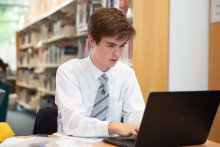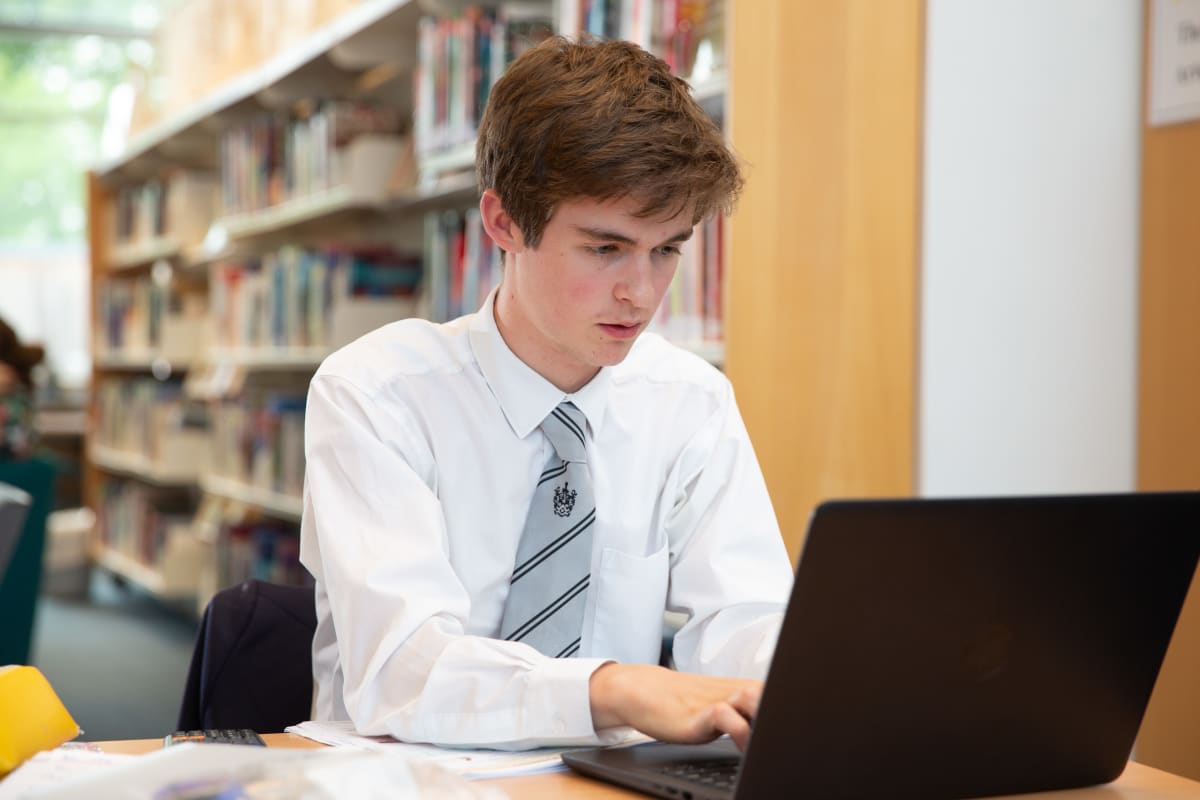






"The use of technology within the classroom will really enable us to bring the outside world in, helping to make Geography an even more exciting and engaging subject. It will provide us with opportunities to explore different places through virtual fieldtrips, examine the most up-to-date evidence for phenomena such as CO2 levels at Mauna Loa and also allow students to collaborate and share their findings. BYOD will give all students the means to analyse their fieldwork data in greater depth and reach more meaningful conclusions through using Geographical Information Systems programmes such as ArcGIS and Digimaps. Students will be able to develop their problem solving and research skills, whilst also developing their independence and competency in key programmes that are used not only in school but beyond."
Head of Geography
"BYOD will unlock so many opportunities in Mathematics. It will be possible to draw any graph instantly; analyse any data set easily; and find problems and solutions on any topic. It will also open up rich learning resources for classroom use such as live quizzes on Dr Frost Maths, guided tutorials on MyMaths, explanation videos, and interactive mini-whiteboard activities. The dynamic nature of packages such as Desmos and Geogebra supports the exploration of questions and concepts bringing a real buzz factor to lessons. It’ll be easier for students to stay organised with their homework, and for teachers to give students valuable feedback. There will be better dialogue between students and teachers through easy sharing of resources and comments. Almost everybody who uses maths in their jobs work with technology at their fingertips, so it makes sense to learn the subject in this way together with the more traditional approaches."
Teacher of Mathematics
"There is great potential for teaching and learning in Modern Languages to be enhanced with the ever-advancing innovations in technology. We will see it as a tool to boost language learning across different key stages in several ways. The quick access to interactive grammar and vocabulary websites and quizzes will serve as an excellent additional tool and pupils always enjoy testing their new language skills! BYOD will be revolutionary for differentiation, allowing colleagues to truly and readily stretch and support pupils - even those who are bilingual within a classroom setting. Oral activities are widely enjoyed but often take up considerable lesson time: this will give us the opportunity to record and listen in no time. We have begun connecting virtually with schools all over the world and this will open up these avenues of communication and relationships further."
Director of MFL
"Connection. That is what really excites me about students bringing devices into the laboratory in the sciences. Yes, learning will be opened up the possibilities of data-logging, investigation-recording, presentation-developing, online-simulating, adaptive-learning, video-making, journal-reading, and independent researching, but the real transformation – the making possible what has so far been impossible – will come from connection: inter-institution, inter-discipline, inter-school, inter-year group and international connection will enable collaboration, expand perspective, develop confidence and encourage and feed curiosity. And I can’t wait!"
Director of Science
"The prospect of all pupils having access to BYOD is an exciting step forward that will allow pupils studying Classics and Classical Languages to take advantage of both the physical learning environment and the innovative digital platforms that have proved so essential in the recent remote learning. It will open up a breadth of multi-sensory learning tools that will enrich the modern learning of the ancient world. BYOD will be an excellent tool to aid collaborative work, for example on classical set texts, and to improve the flow of information and feedback between both teacher and student for instant support as well as extension."
Teacher of Classics
"One of the greatest benefits BYOD will bring for History and Politics lessons will be the opportunities for students to learn anywhere, at any time, and at the pace and mode that fits their unique needs. In Politics, students' political awareness will be enhanced by having access to news articles, and up-to-date research about issues we discuss in class, and which by their very nature, change on a day-to-day basis. Having access to digital resources allows students to personalise their learning and to collaborate, debate and connect more effectively. We already make use of digital content such as Prechewed, and Seneca learning. In History BYOD will allow students to experience learning about the past in collaboration with materials provided by world-,leading historians and institutions, through the digital resources they create. In allowing students to research beyond the confines of the traditional textbook, BYOD will equip students to work at their own individual skill level. It also makes it easier for students to redraft written work in response to teacher and peer feedback, and to collaborate on written work more effectively."
Teacher of History and Politics
"The main thing advantage for me is flexibility. It makes us much more able to respond and pivot based on what happens in a lesson. All our digital resources are at our fingertips, and quickly at theirs using OneNote if we decide to change direction. We no longer have to try to predict the future and guess what extra materials might be required for those going slightly faster or slower. We can simply and efficiently respond to the situation as it unfolds during the lesson. For Physics in particular, the ability to quickly and easily get the pupils to explore using simulations such as PhET doesn’t replace lab work, but does enhance it: these small things improve pupils' understanding, but it can often be unfeasible to get out an experiment, or departmental laptops, for a brief period in a lesson. It will also become natural to use to use Excel to analyse data, a skill which is useful in most fields to some degree. To some extent what is exciting are the efficiencies and enhancements that we don’t yet know. When staff got their own devices I came across a lot of what I find most useful now by forcing myself to work electronically for things like my register of homework. I thought I was fine at the time and didn’t really imagine that the device would improve things for me. I now wouldn’t be without Excel as an electronic register and homework record. OneNote really has changed both how I teach and my day-to-day organisation. It has now even replaced my teacher planner. I am sure as we explore together, we will find similar benefits for the pupils, perhaps in unpredicted areas."
Teacher of Physics
"BYOD is an absolute blessing for the Alleyn's Learners' Programme which teaches critical thinking in accessing information of all kinds and focuses on helping our young people gauge how to be the right person in the moment. Digital literacy and citizenship are at the heart of this for today's learners. This will enable our courses to be even more flexible and adaptive, using information and tools that are right up-to-the-minute. ALP will support pupils on their digital journey by providing relevant strategies for using their personal screens effectively both for learning and well being."
Head of the Alleyn's Learners' Programme
"The introduction of BYOD in Food and Nutrition will help pupils in many aspects of their education specifically with regards to the subject and more generally with their IT skills. Use of photography and video media to present their work will be much easier with devices present in classrooms. Pupils will also be able to watch pre-recorded demonstrations at home and at school prior to practical sessions, utilise nutritional analysis software and perform cost analysis of menus. MS Forms and Excel will be used to conduct research and present results from investigations. More prevalent access to the internet and on-line textbooks will encourage self-directed learning and research. Pupils will be able to collaborate, practise exam questions, receive feedback and share commentary and learning points with the class."
Head of Food and Nutrition
